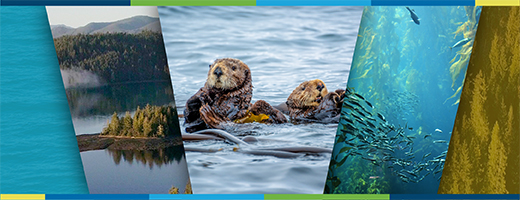Canada has the longest coastline in the world, serving as a home to rich biodiversity and precious ecosystems. The Government of Canada is committed to protecting and restoring these ecosystems for future generations through the Oceans Protection Plan.

Most requested
Contributors
Actions being taken
Assessing the cumulative effects of marine shipping
Working collaboratively with Indigenous Peoples and stakeholders to study and assess the long-term effects of marine shipping.
Launching the Aquatic Ecosystems Restoration Fund
This fund replaces the Coastal Restoration Fund in supporting projects that conserve and restore marine ecosystems. Projects will cover Canada’s coasts and further inland to create opportunities for freshwater and oceans sectors, and coastal and upstream inland communities.
Preventing and removing vessels of concern
Investing in a comprehensive strategy to identify, remove, and prevent hazardous vessels threatening our coasts and shorelines.
Extending the Marine Mammal Response Program Capacity Building Fund
Fisheries and Oceans Canada will increase capacity to help marine mammals in distress.
Increasing scientific support to respond to environmental emergencies
Delivering timely expert scientific and technical advice and increasing enforcement capacity during environmental emergencies.
Renewing Canada’s World Maritime University Chair Position
Renewing the WMU Canadian Chair position to support international marine environmental protection and Canada's coastal and ocean agenda.
Identifying sensitive marine ecosystems and wildlife
Increasing our knowledge to better protect environmentally sensitive areas and wildlife in our marine ecosystems.
Banning heavy fuel oil in the Arctic
Engaging with Indigenous partners, industry, environmental NGOs, and provincial/territorial governments to implement a ban on heavy fuel oil in the Arctic.
Preventing the spread of aquatic invasive species
Implementing new regulations to prevent the spread of invasive species in Canadian waters.
Expanding oceanographic monitoring
Expanding oceanographic monitoring technologies on the east and west coasts to improve safe navigation and reduce the impact of shipping on marine ecosystems.
Assessing and monitoring the effects of vessel traffic on marine mammals
Monitoring and assessing the impacts of major development projects on the Southern Resident Killer Whale and other marine mammals along the coast of British Columbia where vessel traffic is expected to increase.
Protecting whales from vessel collisions
Developing and testing technologies to detect whales in near real-time on both the Atlantic and Pacific coasts.
Managing marine environmental quality
Improving the health of the marine environment through sustainable management of human activities.